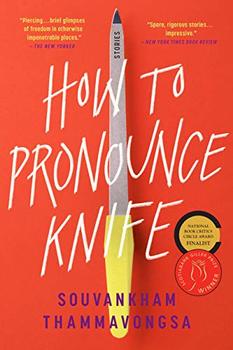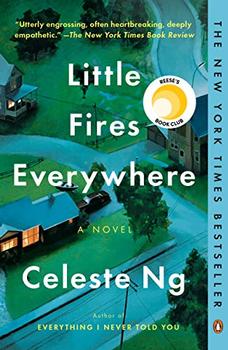Summary | Excerpt | Reviews | Beyond the book | Read-Alikes | Genres & Themes | Author Bio

Stories
by Carrianne LeungCarrianne Leung was a Toronto Book Award finalist for That Time I Loved You as well as for her debut novel The Wondrous Woo (2014). First published in Canada last year, this linked short story collection marks her U.S. debut. It focuses on a suburban Toronto neighborhood whose mostly immigrant residents are alarmed by a recent rash of suicides. The linked short story format (see Beyond the Book) allows Leung to explore different points of view on the same events and show the changes that take place in a community over the course of several years.
Three of the 10 stories are narrated by June, who is 11 years old at the book's start. Her parents came over from Hong Kong 15 years ago. In the first story, "Grass," June tells of a spate of parental suicides that struck her seemingly idyllic neighborhood in 1979. It all begins with their softball coach, Carolyn Finley's dad, who takes a hunting rifle to the basement. Next Georgie Da Silva's mother swallows bleach in the garage. When class bully Larry Lems's alcoholic father is found dead, it's as much a suicide as the others, if less sudden.
Other stories fill in a kaleidoscopic view of the neighborhood, showing how lonely the residents are – and how segregated along ethnic lines. "Flowers" is about Mrs. Da Silva, who came from a Portuguese fishing village and never integrated into Canadian life. Ashamed of her poor English, she avoids social situations. Leung sums up her situation in a heartbreaking sentence: "There were days when she didn't utter a single word." Add in an abusive husband and her mother's death and it's easy to see why suicide beckoned. Racism is another seemingly insurmountable obstacle in this community. In "Things," Darren's Jamaican mother reminds him to keep his head down, even if a teacher picks on him for no good reason.
In "Fences," Francesca, an Italian newlywed quickly settling into the disappointing routines of a housewife, fantasizes about shaking things up through an affair with her new neighbor. "Treasure" reveals that Marilyn, who has always led the neighborhood women in donating meals to the bereaved, is a taker as much as a giver: in her hobby room she keeps a hoard of trinkets she's stolen from others' houses. Leung often emphasizes such differences between a spotless appearance and the more sordid reality. June's best friend, Josie, also Chinese-Canadian, is a dutiful helper to her ill aunt – but no one else knows that her uncle has been molesting her. "Kiss" tells Josie's story, its cute title ironic given the family's secrets.
I especially liked "Sweets," starring June's grandmother Poh Poh, who has at last come to Canada from Hong Kong after years of immigration complications. Through her eyes we see afresh the stifling nature of this cookie-cutter community: "She wanted to be left alone to think of nothing in this nothing place where you could walk and walk for hours but never arrive anywhere new. There were the same houses, the same colourless faces of the gweilos [Cantonese slang for Westerners], the squat supermarkets."
Leung returns to June's perspective at the beginning, middle, and end of the book, so that we see her growing up and learning how the world works. Hard lessons are in store for her: people are sometimes punished for their differences, and the older generation doesn't have it all figured out. Of Josie and June, Leung writes, "The suicides had rocked their already shaky faith that their parents would know what to do. They knew or were learning fast that the adults were as clueless as the kids." June is a bright and curious girl who keeps asking why, but when it comes to the suicides, these characters will never know the full reasons. Yet we as readers, through the stories' shifting perspectives, are privy to deeper insight.
A couple of the other stories felt less than essential for me (mostly "Rain," about a new girl at school), and I have a feeling that the frequent references to the brands and popular culture of the day may make some readers dismiss the book as dated. Others, though, will enjoy a spot of nostalgic time travel. Suburbia gets a bad rap, but it's where so many of us come from, so it's heartening to see a writer taking it seriously. And although this particular community has more than its fair share of unhappy secrets, the connections that form between unlikely allies – like Poh Poh and June's friend Nav, who's persecuted for his effeminate behavior – are sparks of hope. As June reports, "My father once said that it was never completely dark in the suburbs. Light was always escaping and spilling everywhere."
![]() This review
first ran in the March 6, 2019
issue of BookBrowse Recommends.
This review
first ran in the March 6, 2019
issue of BookBrowse Recommends.

If you liked That Time I Loved You, try these:

by Souvankham Thammavongsa
Published 2021
Spare, unsentimental, and distilled to riveting essentials, these "emotionally devastating" stories honor the surreal, funny, and often wrenching realities of trying to build a life far from home (Sheila Heti).

by Celeste Ng
Published 2019
Winner of the 2017 BookBrowse Fiction Award
From the bestselling author of Everything I Never Told You, a riveting novel that traces the intertwined fates of the picture-perfect Richardson family and the enigmatic mother and daughter who upend their lives.
Your guide toexceptional books
BookBrowse seeks out and recommends the best in contemporary fiction and nonfiction—books that not only engage and entertain but also deepen our understanding of ourselves and the world around us.